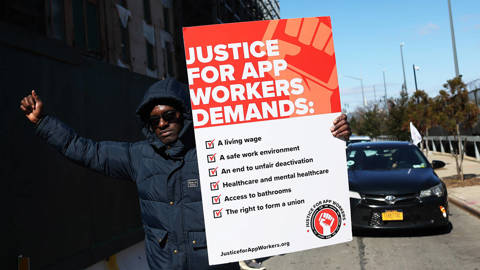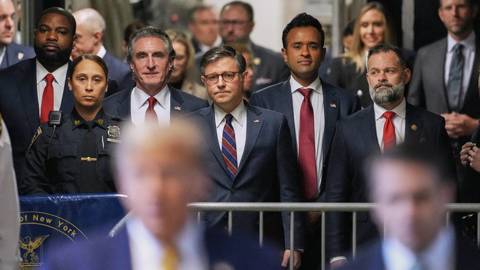NEW HAVEN: Across Europe and America, men in black tie and women in Kenzo and Armani gowns are once more summer pilgrims to places like Bayreuth, Glyndebourne, and Glimmerglass. Once again, too, state coffers are tapped to support these privileged retreats. Perhaps, then, it is also time to ask once again a basic question: should the state continue to ladle out generous subsidies for such an elite activity?
Consider a thing of indisputable beauty and spiritual depth: the Roman Catholic High Mass. Does its grandeur mean that the state should subsidize it? For those who say yes, the case for a subsidy for opera seems straightforward, almost inevitable: if it is appropriate to subsidize the Mass, why not “The Magic Flute”?
For liberals like myself, the case for state-supported opera is more complicated. Whatever else liberalism is, it has always stood for the separation of church and state. Given this commitment, subsidy for the opera raises an obvious question: Since liberals are opposed to the establishment of religion, how can they justify supporting the establishment of one of the great totems of secular humanism — the operas of Mozart, Beethoven, Wagner and other lesser saints in the secular canon?
This question reveals a split within the liberal tradition. On one hand, there is the anticlericalism of the French Enlightenment, best represented by the cultural policies of the French Republic since 1870. On this militant view, there is an easy distinction between the Catholic Mass and “The Magic Flute”. The Mass seeks to sustain the future of an illusion, in Freud’s famous phrase, while “The Magic Flute” is a triumphant demonstration of the spiritual grandeur of the modern spirit. What, then, could be a more suitable task for militant liberalism than to subsidize the latter, while separating itself from the former?
Here we see why heavy subsidies for the opera seem so uncontroversial in Europe. Not only is it rooted in a rich tradition of royal and princely patronage, but it commands broad ideological support in these liberal democratic days. On the right, civilized religionists support the opera to demonstrate a broad-minded concern with subsidizing the great achievements of European civilization, not merely sectarian ones. On the left, civilized Jacobins support opera as one of the ways of conducting Voltaire’s war against the church by other means. While militant liberals may no longer wish literally to “ecraser l’infame,” they may hope to seduce her devotees by an ongoing celebration of the glories of the humanist spirit.
But there is another liberalism that aims for a more thorough disestablishment between the state and a specially privileged culture -- whether it be defined by the texts and celebrations of the Roman or Secular Canon. As much as possible, the liberal state should be neutral on such matters, leaving it to each citizen to determine whether he should give his financial support to the Church of Rome or the one at Bayreuth. In contrast to the militant liberalism of the French tradition, this Neutralist liberal philosophy strives to prevent either side in the ongoing culture war from using the state’s coercive powers of taxation as a weapon in the struggle for men’s souls.
In advocating disestablishment of both religious and secular orthodoxies, I do not wish to trivialize the importance of their ongoing contest over the meaning of life. It is because of the infinite importance of this great debate that the state should strive to be neutral. After all, if the state ostentatiously takes sides in this conversation, it cannot avoid denigrating the ultimate convictions of many of its dissenting citizens.
If, say, a devout religionist protests state sponsorship of the glorification of the Masonic order in “The Magic Flute”, how precisely are partisans of state subsidy supposed to respond? Haven’t they only changed establishments from the old days when it was the partisans of the Enlightenment who protested at state sponsored glorification of the Mass rather than Mozart?
Since I love opera, this liberal rule of abstinence will deprive me of the joys of moral triumphalism on those occasions when I come out on top of the political circus. But even then, I will get something more precious out of a policy of state disestablishment — and that is the construction of a political system in which no citizen disparages the ultimate convictions held by others.
Nor should we blind ourselves to the ritualistic character of modern opera. Most ticketholders treat the event as a secularized religious rite. For a magical evening, a holy sacrament re connects them with the grand bourgeois of 19th century Paris or Vienna, establishing a mystical bond that transcends everyday life.
This is why opera audiences are so remorselessly conservative — demanding, to the chagrin of musical directors, endless repetition of a ritual cycle. A few facts speak eloquently here: in 1911, the average age of an opera performed in German speaking countries was 53 years; half century later, it was 108 years. At that time, operas of Verdi were performed three times more frequently than the operas of the top ten “modern” composers of the twentieth century! In short, our subsidies create the worst kind of state establishment — in which a closed canon is remorselessly repeated despite its increasing distance from the anxieties and concerns of most citizens.
Even if I were wrong about this, and state subsidies promised a great operatic renaissance, my principled objection would remain: it is wrong for the state to glorify any totalizing creed, even my own. If this requires more spartan operatic performances, at higher prices, I accept this as a cost of life in a free society. The state should get out of the business of bribing its adult citizens to adopt an official version of high culture.










NEW HAVEN: Across Europe and America, men in black tie and women in Kenzo and Armani gowns are once more summer pilgrims to places like Bayreuth, Glyndebourne, and Glimmerglass. Once again, too, state coffers are tapped to support these privileged retreats. Perhaps, then, it is also time to ask once again a basic question: should the state continue to ladle out generous subsidies for such an elite activity?
Consider a thing of indisputable beauty and spiritual depth: the Roman Catholic High Mass. Does its grandeur mean that the state should subsidize it? For those who say yes, the case for a subsidy for opera seems straightforward, almost inevitable: if it is appropriate to subsidize the Mass, why not “The Magic Flute”?
For liberals like myself, the case for state-supported opera is more complicated. Whatever else liberalism is, it has always stood for the separation of church and state. Given this commitment, subsidy for the opera raises an obvious question: Since liberals are opposed to the establishment of religion, how can they justify supporting the establishment of one of the great totems of secular humanism — the operas of Mozart, Beethoven, Wagner and other lesser saints in the secular canon?
This question reveals a split within the liberal tradition. On one hand, there is the anticlericalism of the French Enlightenment, best represented by the cultural policies of the French Republic since 1870. On this militant view, there is an easy distinction between the Catholic Mass and “The Magic Flute”. The Mass seeks to sustain the future of an illusion, in Freud’s famous phrase, while “The Magic Flute” is a triumphant demonstration of the spiritual grandeur of the modern spirit. What, then, could be a more suitable task for militant liberalism than to subsidize the latter, while separating itself from the former?
Here we see why heavy subsidies for the opera seem so uncontroversial in Europe. Not only is it rooted in a rich tradition of royal and princely patronage, but it commands broad ideological support in these liberal democratic days. On the right, civilized religionists support the opera to demonstrate a broad-minded concern with subsidizing the great achievements of European civilization, not merely sectarian ones. On the left, civilized Jacobins support opera as one of the ways of conducting Voltaire’s war against the church by other means. While militant liberals may no longer wish literally to “ecraser l’infame,” they may hope to seduce her devotees by an ongoing celebration of the glories of the humanist spirit.
But there is another liberalism that aims for a more thorough disestablishment between the state and a specially privileged culture -- whether it be defined by the texts and celebrations of the Roman or Secular Canon. As much as possible, the liberal state should be neutral on such matters, leaving it to each citizen to determine whether he should give his financial support to the Church of Rome or the one at Bayreuth. In contrast to the militant liberalism of the French tradition, this Neutralist liberal philosophy strives to prevent either side in the ongoing culture war from using the state’s coercive powers of taxation as a weapon in the struggle for men’s souls.
SPRING SALE: Save 40% on all new Digital or Digital Plus subscriptions
Subscribe now to gain greater access to Project Syndicate – including every commentary and our entire On Point suite of subscriber-exclusive content – starting at just $49.99.
Subscribe Now
In advocating disestablishment of both religious and secular orthodoxies, I do not wish to trivialize the importance of their ongoing contest over the meaning of life. It is because of the infinite importance of this great debate that the state should strive to be neutral. After all, if the state ostentatiously takes sides in this conversation, it cannot avoid denigrating the ultimate convictions of many of its dissenting citizens.
If, say, a devout religionist protests state sponsorship of the glorification of the Masonic order in “The Magic Flute”, how precisely are partisans of state subsidy supposed to respond? Haven’t they only changed establishments from the old days when it was the partisans of the Enlightenment who protested at state sponsored glorification of the Mass rather than Mozart?
Since I love opera, this liberal rule of abstinence will deprive me of the joys of moral triumphalism on those occasions when I come out on top of the political circus. But even then, I will get something more precious out of a policy of state disestablishment — and that is the construction of a political system in which no citizen disparages the ultimate convictions held by others.
Nor should we blind ourselves to the ritualistic character of modern opera. Most ticketholders treat the event as a secularized religious rite. For a magical evening, a holy sacrament re connects them with the grand bourgeois of 19th century Paris or Vienna, establishing a mystical bond that transcends everyday life.
This is why opera audiences are so remorselessly conservative — demanding, to the chagrin of musical directors, endless repetition of a ritual cycle. A few facts speak eloquently here: in 1911, the average age of an opera performed in German speaking countries was 53 years; half century later, it was 108 years. At that time, operas of Verdi were performed three times more frequently than the operas of the top ten “modern” composers of the twentieth century! In short, our subsidies create the worst kind of state establishment — in which a closed canon is remorselessly repeated despite its increasing distance from the anxieties and concerns of most citizens.
Even if I were wrong about this, and state subsidies promised a great operatic renaissance, my principled objection would remain: it is wrong for the state to glorify any totalizing creed, even my own. If this requires more spartan operatic performances, at higher prices, I accept this as a cost of life in a free society. The state should get out of the business of bribing its adult citizens to adopt an official version of high culture.